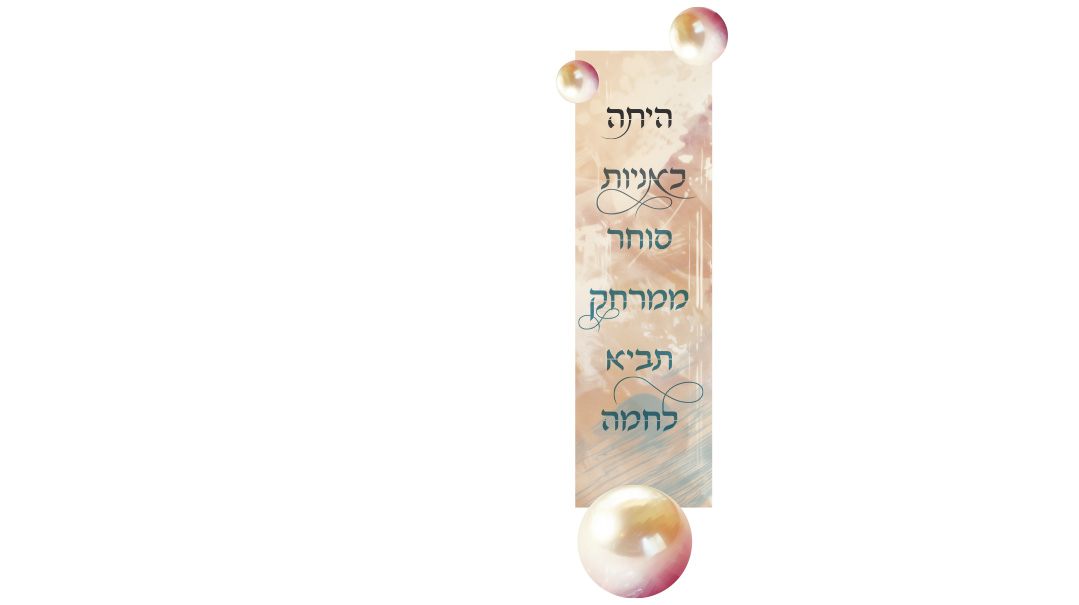He Leads Us to Safety
| October 8, 2024Shlomo Hamelech compares an eishes chayil to one thing — a merchant’s ship

He Leads Us to Safety
Mrs. Shira Hochheimer sees Shlomo Hamelech’s timeless words as a guide to improving ourselves, which will in turn improve our relationship with our spouse and our children.
Shlomo Hamelech compares an eishes chayil to one thing — a merchant’s ship. Driving up I-95 from Baltimore to New York, I see those monstrosities off the side of the road, huge cranes next to them to load and unload the merchandise.
This simile must be teaching us something very important about the essence of what it means to be an eishes chayil.
A merchant’s ship transports merchandise from where it’s in great supply to places far away where they’re scarce, holding the cargo safe as it traverses the vast ocean, weathering storms along the way. This is what the eishes chayil does. When she sees that her husband or children are in need of something, she’ll go to the ends of the earth to locate it for them. There are many ways this plays out. Says the Malbim, when the budget doesn’t add up, the eishes chayil will do whatever she can to support her family. Says the Midrash Eliyahu, she does what she can to contribute to the household income, rather than causing her husband pain by putting all the responsibility on him. Other mefarshim explain that she will shop in markets further away to save a few precious dollars.
When I work to help my family, it takes me away from my family. My mother was a stay-at-home mom. Around eight years ago, she had a brain tumor, which impacted her ability to speak and move. I was visiting her a few years ago and expressed the guilt I feel juggling work with being a wife, mother, and daughter. She looked at me and said, “Hashem makes women need money so that they can become the people they wouldn’t become otherwise.”
This was a great nechamah to me. It reminded me of a Chazal in Kiddushin that says hasapanim ruban chassidim, most sailors are righteous. Out in the middle of the vast ocean, it’s dangerous, says Rashi. Every sailor knows that no matter how big their ship is, the waves and the ocean are bigger. They know that it’s only Hashem Who is guiding them safely from port to port.
This is what it means to be an aniyos socher. We go out into the sea of life and try to balance family and work, which we know can swallow us at any moment. It’s only when we realize that we’re entirely dependent on Hashem that we can be successful.
Question: Does my family have any needs I can help fill?
Shira Hochheimer is the author of Eishes Chayil: Ancient Wisdom for Women of Today, a presenter for Torat Imecha Nach Yomi, and an administrator for WITS in Baltimore, MD.
One Day the Reward Will Come
Mrs. Debbie Greenblatt shows us what we can learn about a Jewish woman’s tremendous capabilities from Shlomo Hamelech’s descriptions of the Eishes Chayil, whatever stage of life she’s at.
TO travel a long distance, a ship has to have everything it needs to sustain its passengers until it reaches port. One of the things that keeps the boat steady is that the hold of the ship is filled with enough fresh water for all the ship’s needs. As the boat approaches its final destination and there is much less water, the boat sways much more (though hopefully the passengers have adjusted to the movement of the ship and hardly notice).
The eishes chayil may travel far from her place of origin. Perhaps her husband’s vocation requires him to settle in a place far from her home. Perhaps she’s been looking for her soul mate for years and decides to move to a new place that may afford her new opportunities. Maybe an opportunity to do kiruv rechokim takes her to distant locations.
Wherever she goes, the eishes chayil takes with her what she needs to maintain who she is. The mesorah from her home and from her teachers that she carries is like the water in the hold of the ship, keeping her steady. She’s like the ship at sea, surrounded by water she can’t drink, reaching into her own depths to quench her thirst.
We’re all maaminim bnei maaminim. Neemanus, trustworthiness, is a cousin of emunah, and is particularly connected to the Jewish woman, as exemplified by the fact that at Har Sinai, Hashem told Moshe to approach the women first (koh somar l’beis Yaakov, eilu hanashim — Rashi) knowing that if Jewish women commit to take on Torah, they will be faithful to that commitment no matter where life takes them.
Torah is compared to many things, including lechem. Just as lechem is absorbed by the body, so, too, Torah is absorbed into the person, bringing spiritual nourishment and growth. In today’s technological world, a woman can both seek and provide spiritual sustenance to those who are far away. Just recently, I was on a Zoom class in the evening Eastern Standard Time, and there was even a woman from Jerusalem, where it was four in the morning.
The Meiri comments that the eishes chayil is like the merchant who sends ships to far places, knowing he won’t see the profit quickly, but trusting that it will come. So, too, the Jewish woman invests in her family’s growth, and in her own, patient that the rewards will come, whether in This World or the next.
Debbie Greenblatt is a senior lecturer for the Gateways organization and a teacher of both the observant and the not-yet-observant. She is also director of education at Core.
Hoping for Better Times
Mrs. Shira Smiles connects the pesukim of Eishes Chayil to the women in Tanach.
The Midrash attributes this pasuk to Rochel Imeinu, describing her daily struggle with her barrenness as Yaakov’s other wives bore child after child. She was eventually rewarded with a son, Yosef Hatzaddik, who, like merchant ships filled with provisions, provided the world with sustenance.
What is the correlation between Rochel’s suffering and this reward?
Rav Ahron Soloveitchik ztz”l identifies Rochel Imeinu’s outstanding quality here as that of longing for goodness that will come. Rachel waited seven years to marry Yaakov Avinu, only to give up the opportunity to protect her sister’s dignity. Then there were 14 years of fervent waiting before she was finally blessed with a child. Rochel then names him, saying, “Yosef Hashem li ben acher — May Hashem grant me yet another son,” expressing her longing for another child.
Rochel Imeinu is etched in history as the distressed mother, crying for her children, yearning for them to return to Eretz Yisrael. The Midrash compares her intense desire to a ship waiting to bring its abundant merchandise to port. Just as she is rewarded with a son, Yosef, she will ultimately be compensated with seeing the fulfillment of Yirmiyahu’s words, “veshavu banim ligevulam.”
Rochel’s name is related to the word yachel, meaning to hope and yearn, as in, “Yachel Yisrael el Hashem — let Israel hope for Hashem.” (Tehillim 130:7) Although she may not merit to see her vision realized in the near future, she doesn’t give up hope.
Rochel Imeinu is the paradigm of our spiritual mother; she is everyone’s Mama Rochel. The Torah introduces us to Rochel as a shepherdess leading her flock of sheep. Upon seeing her for the first time, Yaakov Avinu lifts his voice in a tearful cry. We’re familiar with Chazal’s explanation that he cried because he saw that they wouldn’t be buried together. Rav Moshe Karp (Vayavinu Bamikra) adds: Yaakov Avinu understood Rochel’s profound connection to her children, the “tzon kedoshim.” She’s the shepherdess of the Jewish people, forever their guardian, especially in exile. In L’machar A’atir, Rav Moshe Breslover adds that Yaakov Avinu cried so his tears would reverberate with her tears for all eternity.
The Maharal in Gur Aryeh depicts Rochel Imeinu as a magnet that draws us all back to Eretz Yisrael. Despite the painful hardships and challenging experiences, we can emulate Rochel to never give up hope for better times. We, too, can ache and hope for Geulah, both personally and nationally.
Rebbetzin Shira Smiles is a lecturer in the Yerushalayim area, and a mechaneches in Darchei Binah Seminary. She is the author of five books, Torah Tapestries, which include extensive essays on each parshah.
(Originally featured in Family First, Issue 914)
Oops! We could not locate your form.







